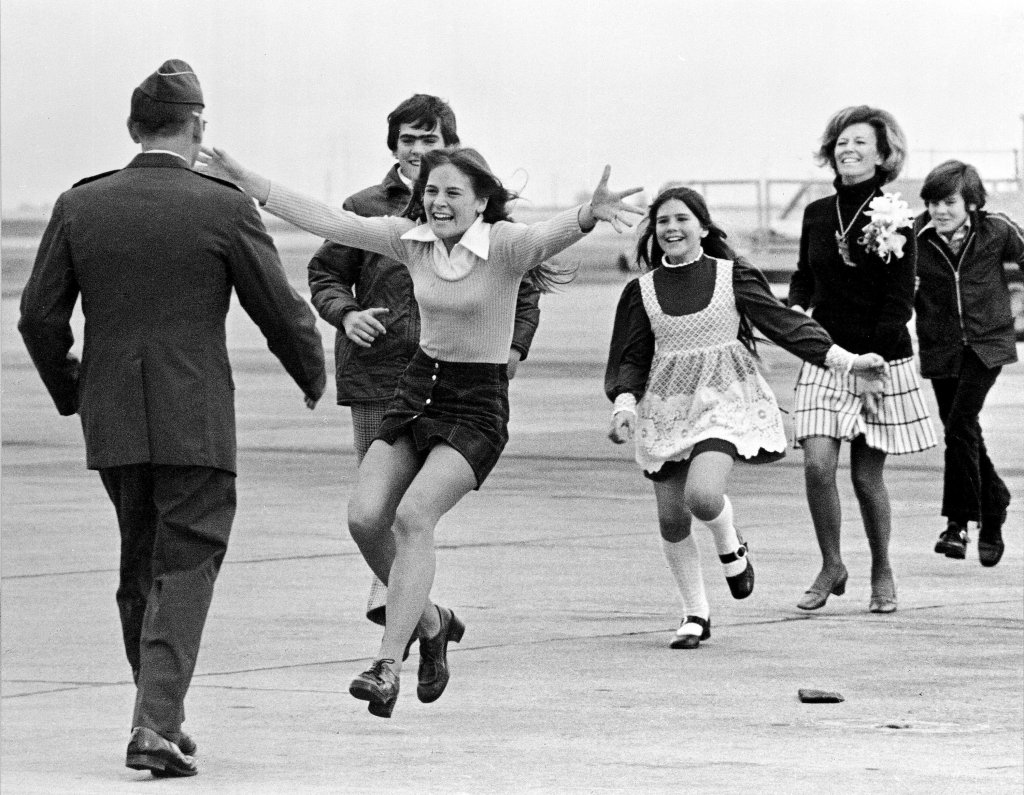Today in History for Sunday, March 17, 2013
Published 8:00 am Sunday, March 17, 2013

- Released prisoner of war Lt. Col. Robert L. Stirm is greeted by his family at Travis Air Force Base in Fairfield, Calif., as he returns home from the Vietnam War, March 17, 1973. In the lead is Stirm's daughter Lori, 15; followed by son Robert, 14; daughter Cynthia, 11; wife Loretta and son Roger, 12. (AP Photo/Sal Veder)
Highlight in History
On March 17, 1973, U.S. Air Force Lt. Col. Robert L. Stirm, a freed prisoner of the Vietnam War, was joyously greeted by his family on the tarmac at Travis Air Force Base in California in a scene captured in a Pulitzer Prize-winning photograph by Slava Veder of The Associated Press.
On this date
In A.D. 461 (or A.D. 493, depending on sources), St. Patrick, the patron saint of Ireland, died in Saul.
In 1762, New York’s first St. Patrick’s Day parade took place.
In 1906, President Theodore Roosevelt first likened crusading journalists to a man with “the muckrake in his hand” in a speech to the Gridiron Club in Washington.
In 1912, the Camp Fire Girls organization was incorporated in Washington, D.C., two years to the day after it was founded in Thetford, Vt. (The group is now known as Camp Fire USA.)
In 1943, the Taoiseach of Ireland, Eamon de Valera, delivered a radio speech about “The Ireland That We Dreamed Of.”
In 1950, scientists at the University of California at Berkeley announced they had created a new radioactive element, “californium.”
In 1963, Mother Elizabeth Ann Bayley Seton, an American, was beatified by Pope John XXIII. (She was canonized 12 years later by Pope Paul VI.)
In 1966, a U.S. midget submarine located a missing hydrogen bomb which had fallen from an American bomber into the Mediterranean off Spain.
In 1970, the United States cast its first veto in the U.N. Security Council. (The U.S. killed a resolution that would have condemned Britain for failure to use force to overthrow the white-ruled government of Rhodesia.)
In 1988, Avianca Flight 410, a Boeing 727, crashed after takeoff into a mountain in Colombia, killing all 143 people on board.
Ten years ago
Edging to the brink of war, President George W. Bush gave Saddam Hussein 48 hours to leave his country. Iraq rejected Bush’s ultimatum, saying that a U.S. attack to force Saddam from power would be “a grave mistake.” In Washington, D.C., tobacco farmer Dwight Ware Watson, claiming to be carrying bombs, drove a tractor and trailer into a pond on the National Mall; the threat disrupted traffic for two days until Watson surrendered; there were no bombs. (Watson served 16 months in prison.)
Five years ago
Democratic presidential candidate Hillary Rodham Clinton, recalling a goodwill trip she’d made to Bosnia as first lady in March 1996, said she remembered landing under “sniper fire” — a statement that conflicted with accounts of the time. David Paterson was sworn in as governor of New York; he succeeded Eliot Spitzer, who’d resigned because of a prostitution scandal. A female suicide bomber struck Shiite Muslim worshippers in the holy city of Karbala, killing at least 49 people. Former Beatle Paul McCartney’s divorce from Heather Mills was settled for $48.6 million.
One year ago
Bombings killed at least 27 people near intelligence and security buildings in the Syrian capital Damascus. John Demjanjuk, 91, convicted of being a low-ranking guard at the Sobibor death camp, but who maintained his innocence, died in Bad Feilnbach, Germany.





